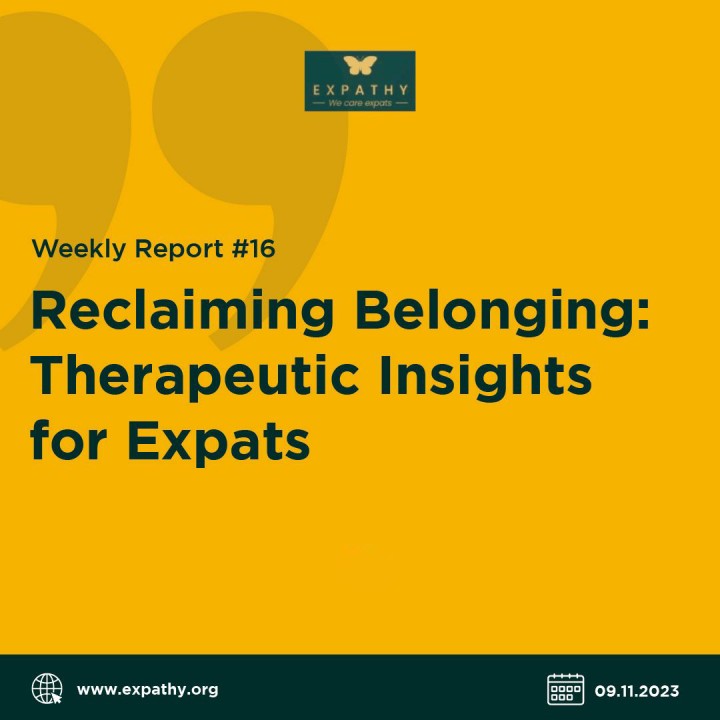Reclaiming Belonging: Therapeutic Insights for Expats
The experience of expatriation, while often exciting and enriching, can come with a unique set of challenges. Expats may find themselves wrestling with complex emotions related to a perceived lack of belonging and growing dissatisfaction with the expat lifestyle. These feelings can be multi-faceted and nuanced, encompassing a range of psychological, social, and cultural dimensions. In a therapeutic context, it’s crucial to explore these feelings with depth and sensitivity, considering various factors that contribute to this phenomenon. Given the current topic’s complexity and breadth, reading the previous articles on related topics (e.g. culture shock, language barriers, difficulties in broadening one’s network, etc.) may be informative.

The Multifaceted Nature of Belonging
The expat’s sense of belonging is a complex construct. It goes beyond just being part of a social or professional network. It can involve factors such as cultural norms, societal expectations, differences in priorities between the home country and the host country, and the duration of stay. For expats, a sense of grief can be a common response to the loss of the life they once knew, their familiar context, and the people who were once a significant part of their lives. It’s essential to acknowledge and address this grief as a valid part of their experience.
Distinguishing Home vs. Host Country Belonging
A crucial therapeutic consideration is distinguishing between a lack of belonging in one’s host country and a sense of not belonging in their home country. Both scenarios can lead to feelings of alienation and unhappiness, and it’s essential for therapists to identify which kind of belonging the client is struggling with. This distinction guides the therapeutic approach.
Factors Influencing Belonging
Belonging is a dynamic construct influenced by time and personal factors. Time can significantly impact the development of a sense of belonging. Also, personal adjustment, self-acceptance, and self-esteem play roles in the formation of one’s sense of belonging. For expats, it is essential to balance maintaining connections with their roots and establishing connections in their new environment.
Leveraging past feelings of Belonging
Exploring past experiences where the expat did feel a sense of belonging is a crucial aspect of the therapeutic process, which allows us to dissect the context and contributing factors that facilitated a sense of belonging. This analysis helps identify potential sources and barriers to belonging in the expat’s current situation.
Moreover, drawing parallels between these past experiences and the current circumstances can be insightful. Recognizing similarities and differences offers valuable insights into how the expat can navigate their present feelings of detachment. It’s an essential step towards understanding and ultimately overcoming the challenges they face in their new environment.
Striving for Balance
Expats should aim to balance maintaining connections with their roots and establishing connections within their new environment. This equilibrium can help foster a stronger sense of belonging while retaining their cultural identity.
Self-esteem and Sense of belonging
Identity Exploration
Identity exploration is a vital therapeutic intervention. Living as an expat often involves navigating a complex interplay between one’s original identity and the identity formed in the host country. Assisting clients in this process of self-discovery is essential for their well-being.
Challenging False Beliefs
Expats may harbor limiting beliefs that hinder their sense of belonging. Working with a therapist, they should examine and challenge these false beliefs. The experienced lack of belonging might not necessarily be due to a lack of abilities but instead driven by imposter syndrome or self-doubt.
Embracing Imperfection and Building Self-Esteem
It’s essential for expats to recognize that perfection is not a prerequisite. Learning to embrace imperfections can significantly boost their confidence. Therapists can collaborate with clients to develop self-esteem through exercises like daily reflections on personal achievements, especially in their professional contexts.
Emotional Responses to Lack of Belonging
Addressing Concurrent Symptoms
As a result of or alongside their feeling of lack of belonging, clients may exhibit symptoms like chronic anxiety, which need to be addressed as a priority. Dealing with these immediate symptoms can significantly impact the individual’s capacity to work on their broader sense of belonging.
Addressing Overwhelming Emotions
Feeling overwhelmed is a common response to a lack of belonging and dissatisfaction with the expat lifestyle. It’s essential to disentangle the sources of these emotions. Sometimes, other factors like anxiety or depression may contribute to these feelings, and addressing these symptoms should be a primary focus.
Accepting Uncomfortable Feelings
Relocating to an unfamiliar environment naturally triggers discomfort. These feelings are part of the adjustment process and should be acknowledged and accepted as part of the expat experience. Therapists can help clients develop resilience and coping strategies, tailored to the expat’s situation.

The Impact of Age and Timing
Pros and cons of relocating at a young age
Age significantly influences how expats perceive a lack of belonging. Younger individuals, due to their limited lifetime accumulation of personal resources, often experience these feelings more acutely. Their social network, emotional resilience, and coping mechanisms may not be as developed, intensifying the sensation of not belonging.
Conversely, youth can be an advantage in adaptation. Younger people tend to be more open to change and less preoccupied with preconceived notions about where they should belong. Their adaptability, coupled with potentially lower expectations of a deep-rooted sense of belonging, can lead to a more positive expat experience for them.
Importance of a Life Plan
A person’s life plan can significantly influence their sense of belonging. Uncertainty about where to “settle down” may prolong feelings of not belonging. A sense of belonging may not be necessary for shorter stays, but it becomes more relevant when considering long-term decisions.
Religious Belonging and Cultural Identity
Cultural and religious identity can be central to a person’s sense of belonging. Expats moving between countries with significant differences in religious or cultural norms may experience dissatisfaction. Therapeutic exploration of these changes can be instrumental in the emotional well-being of expats struggling with a feeling of lack of belonging.
Conclusion
The experience of expatriation, characterized by a lack of belonging and discontent with the expat lifestyle, is multifaceted. It involves the interplay of various factors such as time, personal adjustment, self-identity, and the influence of age. In a therapeutic context, addressing these challenges necessitates distinguishing between the lack of belonging in the host country and in the home country, challenging limiting beliefs, and nurturing self-esteem. Accepting uncomfortable emotions and exploring cultural and religious identity are vital steps in the therapeutic process. Understanding and addressing these complexities are key to supporting expats on their journey to regaining a sense of belonging and contentment in their new environment.